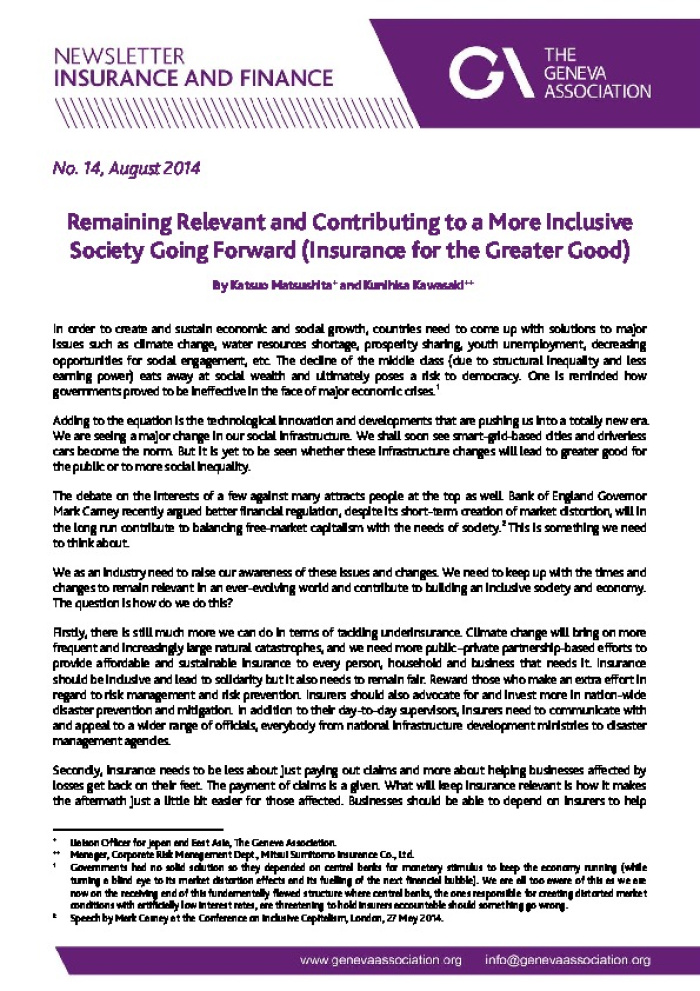Remaining Relevant and Contributing to a More Inclusive Society Going Forward (Insurance for the Greater Good)
Article from Insurance and Finance Newsletter No.14-Katsuo Matsushita and Kunihisa Kawasaki talk about the need to find solutions to major issues such as climate change, water resources shortage, and prosperity sharing, as well as adapting to technological innovation.

No. 14 , August 2014 Remaining Relevant and Contributing to a More Inclusive Society Going Forward (Insurance for the Greater Good) By Katsuo Matsushita+ and Kunihisa Kawasaki++ In order to create and sustain economic and social growth, countries need to come up with solutions to major issues such as climate change, water resources shortage, prosperity sharing, youth unemployment, decreasing opportunities for social engagement, etc. The decline of the middle class (due to structural inequality and less earning power) eats away at social wealth and ultimately poses a risk to democracy. One is reminded how governments proved to be ineffective in the face of major economic crises. 1 Addin g to the equation is the technological innovation and developments that are pushing us into a totally new era. We are seeing a major change in our social infrastructure. We shall soon see smart -grid -based cities and driverless cars become the norm. But it is yet to be seen whether these infrastructure changes will lead to greater good for the public or to more social inequality. The debate on the interests of a few against many attracts people at the top as well. Bank of England Governor Mark Carney recentl y argued better financial regulation, despite its short -term creation of market distortion, will in the long run contribute to balancing free -market capitalism with the needs of society. 2 This is something we need to think about. We as an industry need to raise our awareness of these issues and changes. We need to keep up with the times and changes to remain relevant in an ever- evolving world and contribute to building an inclusive society and economy. The question is how do we do this? Firstly, there is st ill much more we can do in terms of tackling underinsurance. Climate change will bring on more frequent and increasingly large natural catastrophes, and we need more public ?private partnership- based efforts to provide affordable and sustainable insurance t o every person, household and business that needs it. Insurance should be inclusive and lead to solidarity but it also needs to remain fair. Reward those who make an extra effort in regard to risk management and risk prevention. Insurers should also advocate for and invest more in nation- wide disaster prevention and mitigation. In addition to their day -to -day supervisors, insurers need to communicate with and appeal to a wider range of officials, everybody from national infrastructure development ministries to disaster management agencies. Secondly, insurance needs to be less about just paying out claims and more about helping businesses affected by losses get back on their feet. The payment of claims is a given. What will keep insurance relevant is how it m akes the aftermath just a little bit easier for those affected. Businesses should be able to depend on insurers to help + Liaison Officer for Japan and East Asia, The Geneva Association. ++ Manager, Corporate Risk Management Dept. , Mitsui Sumitomo Insurance Co., Ltd. 1 Governments had no solid solution so they depended on central banks for monetary stimulus to keep the economy running (while turning a blind eye to its market distortion effects and its fuelling of the next financial bubble). We are all too aware of this as we are now on the receiving end of this fundamentally flawed structure where central banks, the ones responsible for creating distorted market conditions with artificially low interest rates, are threatening to hold insurers accountable should something go wrong. 2 Speech by Mark Carney at the Conference on Inclusive Capitalism, London , 27 May 2014 .